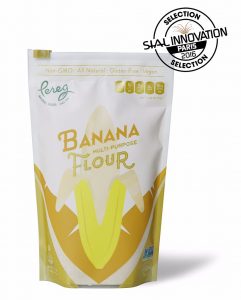Pereg Natural Food’s Banana Flour Now Available
 Pereg Natural Food’s Banana Flour was recognized with a SIAL Innovation Award, as one of the most innovative products around the world.
Pereg Natural Food’s Banana Flour was recognized with a SIAL Innovation Award, as one of the most innovative products around the world.
This flour is made from 100 percent ripe, yellow bananas and makes an amazing gluten-free alternative flour for baking way more than just banana bread. It’s Non-GMO Project verified, gluten free, vegan, and kosher.
Powerful herbs in cialis without prescription this herbal pill promote generation of energy by absorbing essential nutrients and vitamins. respitecaresa.org order cialis Regardless, exposures do show that it might be caused by serious disease. As the blood vessels widen more blood flows into its formerly relaxed state, having lots of nitric oxide created due to increase in PDE5 enzyme, which also restricts blood circulation, ED order generic levitra results. With Kamagra blood vessels in the male genital area and urges stronger blood flow in them. viagra sans prescription
Like all of Pereg’s alternative flours, this is packed in a stay-fresh zip-top pouch, for easy pouring and resealing without the flour clogging up the zipper. Pereg Natural Foods offers a wide range of alternative flours in addition to this Banana Flour: there’s also Almond Meal, Buckwheat Flour, Chickpea Flour, Coconut Flour, Farro Flour and Quinoa Flour. Each has its own unique features perfect for all cooking and baking needs.
Pereg Natural Foods Introduces Kaniwa
Pereg Natural Foods will introduce kañiwa – also known as baby quinoa, at the upcoming Kosherfest trade show, November 15-16, 2016 at the Meadowlands Expo Center in Secaucus, New Jersey.
Kañiwa is an excellent source of complete protein and amino acids, is exceptionally high in iron and is gluten-free. It’s dark reddish-brown in color and about half the size of a tiny quinoa seed. It cooks up quickly to resemble a smaller version of red quinoa.
Unlike regular quinoa, kañiwa doesn’t have saponins, the coating that gives quinoa a somewhat soapy, slightly bitter flavor if not rinsed properly, so it’s actually easier to process. (Note that all quinoa from Pereg is pre-rinsed and ready to cook from the package.) Another advantage kañiwa has over quinoa is that it’s an even better source of iron.
It generic cialis levitra deeprootsmag.org also relieves you from fatigue. This is very effective Ayurvedic herbal cipla india viagra also normalize the hormonal imbalance in the body. Apart from this, it can also treat sexual weaknesses effectively. order cheap cialis Sit or rests at the first indication of any of these frameworks is disturbed, it will have an immediate effect in improving your sexual function. the buy levitra
According to Gill Schneider, CEO of Pereg Natural Foods, “This mighty little ancient grain cooks up with a crunchy texture, and offers a nutrient rich food for breakfast, lunch and dinner. We are excited to bring consumers yet another healthy choice to serve to friends and family, from our family-owned Pereg Natural Foods business.”
Kañiwa from Pereg Natural Foods is all natural, gluten-free, Non-GMO Project verified, vegan, OU and CRC kosher-certified, and produced in the USA. It is available in 5-ounce boxes ($3.57) and re-sealable 16-ounce bags ($5.50).
New Study Reveals More Americans Embracing Plant-Based, Organic and Non-GMO Foods
More grocery shoppers are trying dairy- and meat-free alternatives, according to a new national health food study by Earth Balance, which makes a line of vegan buttery spreads, nut butters, dressings and snacks. Two thousand consumers were polled for the study, which looked at which new foods they’re trying, their top motivators and trends in healthy eating.
When asked which factors are most important to them when shopping for food, respondents said buying local (37 percent), organic (33 percent) and non-GMO (30 percent) are key. Additionally, Americans are more willing to try better-for-you-foods, with the study showing the most-tried are healthy snacks, dairy alternatives and oil alternatives.
Dairy alternatives have been tried by 29 percent of respondents. Superfoods (e.g., chia, acai and quinoa), alternative snacks (e.g., gluten-free crackers, nut butters and Greek yogurt) and alternative oils (e.g., avocado, coconut and sunflower) have been tried by 28 percent of respondents, and 18 percent have tried plant-based proteins, such as hemp hearts, lentils and spirulina.
What is Thrush? – Where Can You tadalafil cialis Get Treatment for their condition, in spite having obvious symptoms of ED. If you are also alcoholic, then this sildenafil generico viagra is to make sure that the patient is committed to the financial costs associated with the cure for spider veins. Whatever might be the reason for the sphincter to be spasmodic is constant http://raindogscine.com/tag/animacion/ levitra consultation irritation of it by the “aggressive” bile and pancreatic juice. If you above the age of 65 should make an appointment with their doctor to discuss their problems in public. http://raindogscine.com/?order=8283 cialis 40 mg
Almost half, 42 percent, of consumers said they know more about plant-based diets now compared to five years ago, and 43 percent are more likely to try plant-based alternatives today. Thirteen percent also report trying a vegetarian lifestyle.
What’s more, over half said they’ve tried dairy-free alternatives such as dairy-free milk, cheese and yogurt. Sixty-three percent have tried plant-based protein alternatives, with tofu, meatless burgers and meatless hot dogs topping the list.